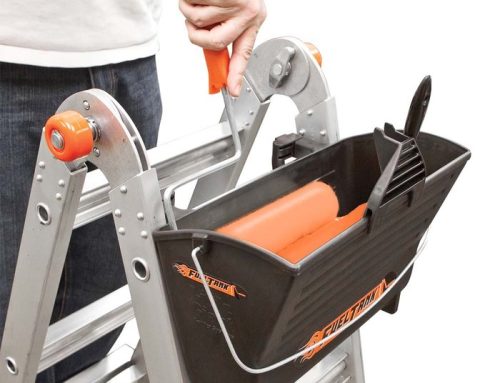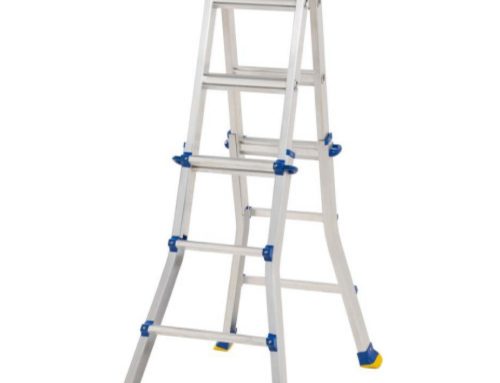It's not just ladders that need safe use. A few tales to learn from here, starting with a work platform being lifted on the forks of a telehandler – without being secured! Then read on for some important new HSE legislation.
Workers' falls land building company in court
A Leicestershire building company has been fined after two workers fell four metres from an insecure platform balanced on the raised forks of a telehandler.
Leicester Magistrates' Court last week heard that Caplin Homes Ltd was building a new house on land in Stretton Road, Great Glen, when the incident happened on 25 April 2013. Managing director Stuart Caplin, his son and self-employed builder Jason Caplin and a self-employed joiner, Robert Coleman, arrived on site and decided to take some photographs of the partially completed project to record progress. A Health and Safety Executive (HSE) investigation found that in order to get a high level shot an enclosed work platform was placed on the forks of a telehandler and raised with Jason Caplin and Robert Coleman inside. However, it was not secured to the forks and as the telehandler extended the platform slid off sending the two workers crashing to the ground. Both men were airlifted to hospital. Jason Caplin, 32, of Great Glen was diagnosed with a fractured heel and spine compression requiring pins. He was off work for three months. Robert Coleman, 52, of Beaumont Leys, Leicester, suffered a broken collarbone, collapsed lung, fractured pelvis, lacerated spleen and three broken ribs and has not yet been able to return to work. Caplin Homes Ltd, of Stretton Road, Great Glen, Leicestershire, pleaded guilty to breaching Regulation 5(1) of the Lifting Operations and Lifting Equipment Regulations 1998 and was fined £4,000 and ordered to pay costs of £460. Speaking after the hearing HSE Inspector Tony Mitchell said: "This was an ill-conceived and totally preventable incident that resulted in two people suffering significant injuries which could easily have been fatal. "Work platforms on telehandlers are not suitable for construction work unless special control systems are in place. More importantly they must be securely attached."
HSE unveils changes to reporting requirements
The Health and Safety Executive (HSE) has, this week, formally implemented changes to simplify the mandatory reporting of workplace injuries for businesses. Changes to the Reporting of Injuries, Diseases and Dangerous Occurrences Regulations (RIDDOR) 1995 clarify and simplify the reporting requirements, while ensuring that the data collected gives an accurate and useful picture of workplace incidents. The change affects all employers – including the self-employed. New web-based information and guidance is now available on the HSE website at:http://www.hse.gov.uk/riddor/index.htm The main changes are in the following areas:
- The classification of 'major injuries' to workers replaced with a shorter list of 'specified injuries'
- The existing schedule detailing 47 types of industrial disease replaced with eight categories of reportable work-related illness
- Fewer types of 'dangerous occurrence' require reporting
There are no significant changes to the reporting requirements for:
- Fatal accidents
- Accidents to non-workers (members of the public)
- Accidents resulting in a worker being unable to perform their normal range of duties for more than seven days
How an incident at work is reported and the criteria that determine whether an incident should be investigated remain the same. Commenting on the impact of the changes, Dave Charnock, HSE policy lead for the revisions to RIDDOR, explained: "Reporting under RIDDOR is a legal requirement for companies. RIDDOR reports, along with all other complaints and information received by HSE, will continue to be examined in conjunction with our Incident Selection Criteria to determine the need for investigations – this is not something new. "It will not alter the current ways to report an incident at work. The principles of what must be recorded remain largely unchanged – everything that is reportable must also be recorded (other than gas events), together with over-3-day lost time accidents. "The aim is to simplify and clarify reporting requirements, whilst ensuring that a useful supply of information is retained, to provide sufficient data for HSE and others to act in a risk-based manner, and to enable European and international obligations to be met. The proposed changes will facilitate improved reporting of such information, whilst not requiring businesses to provide information that is either not used or could be better obtained from other sources."
Changes to first aid regulations come into effect
Businesses now have more flexibility in how they manage their provision of first aid in the workplace following a change in health and safety regulations. As of Tuesday, 1 October 2013, the Health and Safety (First Aid) Regulations 1981 have been amended, removing the requirement for HSE to approve first aid training and qualifications. The change is part of HSE's work to reduce the burden on businesses and put common sense back into health and safety, whilst maintaining standards. The changes relating to first aid apply to businesses of all sizes and from all sectors. Andy McGrory, HSE's policy lead for First Aid, said: "HSE no longer approves first-aid training and qualifications. Removing the HSE approval process will give businesses greater flexibility to choose their own training providers and first aid training that is right for their work place, based on their needs assessment and their individual business needs. "Employers still have a legal duty to make arrangements to ensure their employees receive immediate attention if they are injured or taken ill at work." Information, including the regulations document and a guidance document to help employers identify and select a competent training provider to deliver any first-aid training indicated by their first-aid needs assessment are available on the HSE website at http://www.hse.gov.uk/firstaid/. HSE will continue to set the standards for training. While the changes give employers flexibility, the one day Emergency First Aid at Work (EFAW) and three day First Aid at Work (FAW) courses remain the building blocks for first aid training. As part of the changes, the Approved Code of Practice (ACOP) text which was previously included in guidance document L74 (which consisted of only 12 sentences), has been incorporated into the new guidance. The advice in the guidance sets out clearly the recommended practical actions needed, and the standards to be achieved, to ensure compliance with duties under the 1981 Regulations. This is intended as a comprehensive guide on ensuring compliance with the law.






Leave A Comment
You must be logged in to post a comment.